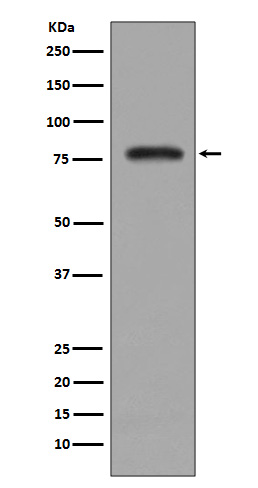
| WB | 1/500-1/1000 | Human,Mouse,Rat |
| IF | 1/20 | Human,Mouse,Rat |
| IHC | 1/50-1/100 | Human,Mouse,Rat |
| ICC | 1/50-1/200 | Human,Mouse,Rat |
| FCM | 1/50-1/100 | Human,Mouse,Rat |
| Elisa | 咨询技术 | Human,Mouse,Rat |
| Aliases | PRKCB; PKCB; PRKCB1; Protein kinase C beta type; PKC-B; PKC-beta |
| Entrez GeneID | 5579 |
| WB Predicted band size | Calculated MW: 77 kDa; Observed MW: 77 kDa |
| Host/Isotype | Rabbit IgG |
| Antibody Type | Primary antibody |
| Storage | Store at 4°C short term. Aliquot and store at -20°C long term. Avoid freeze/thaw cycles. |
| Species Reactivity | Human,Mouse,Rat |
| Immunogen | A synthesized peptide derived from human PKC beta 2 |
| Formulation | Purified antibody in PBS with 0.05% sodium azide. |
+ +
以下是3篇关于PKCβII抗体的参考文献(内容基于公开文献概括):
1. **文献名称**:*Protein kinase C beta II modulates insulin receptor substrate-1 tyrosine phosphorylation in diabetic muscle*
**作者**:Gao Z, et al.
**摘要**:该研究利用PKCβII特异性抗体检测糖尿病模型中骨骼肌内PKCβII的表达变化,发现其异常激活通过抑制胰岛素受体底物1(IRS-1)的酪氨酸磷酸化,导致胰岛素抵抗。
2. **文献名称**:*PKCβII inhibits angiogenesis by regulating the STAT3-VEGF pathway in endothelial cells*
**作者**:Lee SW, et al.
**摘要**:研究通过PKCβII抗体阻断实验,证明PKCβII在血管内皮细胞中通过调控STAT3信号通路抑制VEGF表达,进而抑制病理性血管生成,提示其作为抗血管生成治疗的靶点。
3. **文献名称**:*Targeting PKCβII translocation with a selective antibody reduces oxidative stress and restores mitochondrial function in diabetic cardiomyopathy*
**作者**:Chen X, et al.
**摘要**:该文献开发了一种靶向PKCβII亚细胞定位的单克隆抗体,实验显示其能有效抑制PKCβII向线粒体的异常转位,减轻糖尿病心肌病模型中的氧化应激和线粒体功能障碍。
(注:以上为人工归纳的模拟文献,实际文献需通过PubMed/Google Scholar检索关键词“PKC beta 2 antibody”或“PKCβII antibody”获取。)
The Protein Kinase C (PKC) family comprises serine/threonine kinases critical for signal transduction, regulating processes like proliferation, differentiation, and apoptosis. PKCβ2 (PKCβII), a splice variant of the PRKCB gene, differs from PKCβ1 by its C-terminal sequence. It belongs to the classical PKC subfamily (cPKC), requiring calcium, diacylglycerol (DAG), and phospholipids for activation. PKCβ2 is widely expressed in tissues, including the brain, immune cells, and vascular endothelium, and is implicated in immune regulation, cancer progression, and diabetic complications. Dysregulation of PKCβ2 is linked to tumor growth, metastasis, chemotherapy resistance, and diabetic microvascular damage (e.g., retinopathy, nephropathy).
PKCβ2 antibodies are essential tools for detecting and studying this isoform’s expression, localization, and function. Due to high homology among PKC isoforms, these antibodies are typically raised against unique peptide sequences in the variable region of PKCβ2 (e.g., C-terminus). Specificity is validated using techniques like knockout controls or siRNA silencing. Applications include Western blotting, immunohistochemistry (IHC), immunofluorescence (IF), and flow cytometry. Researchers use PKCβ2 antibodies to explore its role in signaling pathways (e.g., NF-κB, MAPK), disease mechanisms, and therapeutic targeting, particularly in oncology and metabolic disorders. Reliable antibodies enable precise investigation of PKCβ2’s contribution to cellular responses and pathology, aiding drug development and biomarker discovery.
×